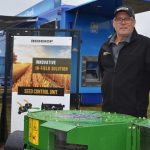A new Canadian Forage and Grasslands Asssociation high-performance forage program will be a resource for farmers, agronomists and others in the forage sector.


Program is meant to be a resource for farmers, agronomists and others in the forage sector

A Saskatchewan organic producer reports stronger plant outcome using a precision agriculture robot for seeding

EPA violated procedures mandating public input, judge rules


Spraying tips to use once the combine is parked

Weed infamous in U.S. for multiple herbicide resistances

Manitoba’s list of affected municipalities keeps growing

As with all herbicide applications, follow the label, especially on application timing

'Those seedlings we don’t manage to kill (are) probably the most herbicide-resistant'

'You’re not going to spray your way out of this'